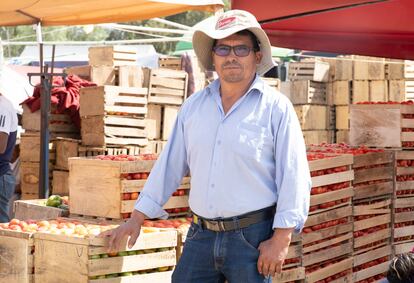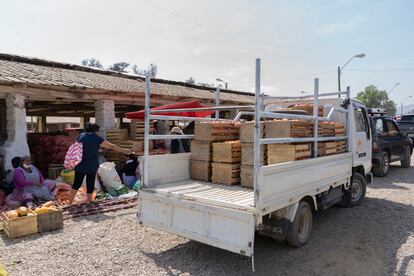EL PAÍS offers the América Futura section openly for its daily and global information contribution on sustainable development. If you want to support our journalism, subscribe here.
On Tuesdays and Thursdays, around 2 in the morning, hundreds of trucks begin to arrive at the Mercado Integración del Sur. Each of these heavy-duty vehicles, with a capacity of four tons, is unloaded and the darkness of the night begins to be colored by what the wooden boxes they transport contain: the bright greens and reds of bell peppers and tomatoes; the pinks and browns of the soil-covered potato and the purples, oranges and yellows of the grape, peach and apple. It is the color palette of the products that have traveled hundreds of kilometers to reach their destination in the city of Cochabamba, in central Bolivia, bypassing intermediaries and resellers, with the aim of offering the producer’s harvest to the consumer.
For almost two years, this 5.5 hectare space, self-managed by agricultural producers in the south of this department of the Andean-Amazon nation, has become a decent and recognized commerce alternative for at least 2,000 farmers. Every Tuesday and Thursday, hundreds of them arrive from different areas with hundreds of varieties of fruits, vegetables and tubers, such as potatoes, oca or papaliza.
The Southern Integration market was created as an alternative for thousands of producers who previously sent their crops to the city to another space, located in a peripheral area known as El Arco, one of the most important points of sale for agricultural workers. of this region. However, for decades, they were the prey of resellers and intermediaries who imposed their conditions and prices without valuing the sacrifice that it represents for them to produce, harvest and bring food to the cities.
“We know how our parents have lived, but we do not want to be in the same conditions as them. We sent the vegetables and the retailer wanted to pay us 25 or 20 pesos [un poco más de 3 dólares] for a box worth 60 [un poco más de 8 dólares]. They traded with the work of the poor farmer. That’s why I put my shoulder, the strength and the will to want to have my own market for my people. Now we have our own land where we can feel happy to be recognized for our production,” says Eduardo Nova, representative of the producers of the town of Saipina, almost 300 kilometers away from where the Southern Integration market is located.
Joint negotiation of space and prices
The abandonment of El Arco and the self-management of a new market was emblematic. According to specialists, for a decade there have been farmers’ markets in the city, initiatives that were designed so that agricultural producers could market their products freely, but these have been entirely occupied by resellers, who do little or no favor to the producers. According to Mariana Alem, who studies the conditions of producers in Bolivia, in this way farmers become a kind of “financiers”, since “arbitrary” prices often go to the detriment of their work, that is, the prices They are kept very low at the expense of the producers.
Manuel Moreira Rocha, president of the Association of Producers, relates that when they went on a pilgrimage selling to different places in the city – due to the interference of resellers – they were victims of insecurity, inclement weather due to not having a place with a roof, in addition of accepting unfair conditions when carrying out transactions. It is for this reason, as he says, that negotiating power on price is very important, because they work with products that deteriorate quickly and a large majority of farmers must return to take care of their plots. Furthermore, many times the city is not so kind to the trucks in which they bring their products, especially if the sale congests important routes in the city.

Alem considers that this step forward “was very important due to the strength generated by not being alone, since together they can have a safe space and great empowerment to negotiate the price that corresponds to them.”
In Bolivia there are more than 850,000 productive units. More than 700,000 of them are small farms that bring together more than two million family farmers of peasant, native indigenous and intercultural origin, whose production is diversified and supplies the family basket, according to data from the Coordinator for the Integration of Indigenous Peasant Economic Organizations Original.
The chef of the Cochabamba Hotel, Miguel Ángel Figueroa, says that when these producers were no longer in El Arco, he took on the task of looking for them. Today he continues to be a good customer of this popular fair, since they supply him with everything he needs and sometimes in very large quantities. “It is more quality to buy from the producer to the consumer,” he says, and emphasizes the importance of having direct contact with farmers: “We must not lose our identity and we must support our producers.”
In the market, a single producer can bring between 300 to 400 boxes of tomatoes, around 15 tons of product, but at the same time there are others who transport less for people looking to make their purchases in smaller quantities. “Although it is an investment of time and money to travel to this place, it is justified by the quality and variety of the products. The prices are lower than in the peasant market, that’s why I like to come here,” says María Perez, a housewife who is looking for her weekly groceries.

In their bid to publicize the space, the farmers of the Southern Integration Market are active on social networks such as Facebook or even on TikTok, which they use to publicize the weekly offers, seasonal products and so that Their associates can also have a voice and tell their stories about where they come from and the type of agricultural work they do. One of her most viewed videos, with more than 45,000 views, features Rosa Castro, a producer from the municipality of Totora, who, in the Quechua language, introduces the potato and tubers produced in her region.
The space that the market occupies today is only a small part, since they have three hectares that they have not yet used. Now they are planning to build an infrastructure that can accommodate more associates. However, despite the small victory of obtaining space, the drought and high temperatures recorded last year are a factor that worries farmers. Despite the anxiety, local governments and the national Executive only obtain symbolic support and promises when an electoral period approaches.
“Being a farmer in Bolivia is a very hard job,” says Moreira, mentioning the smuggling of agricultural products with which they cannot compete due to the low prices they are sold. According to data from the National Customs of Cochabamba, in only two operations carried out last April, more than 28 tons of contraband flour and fruits were seized. The value of all the merchandise exceeded 184,500 bolivianos or 25,000 dollars. According to the National Chamber of Industries, the impact of this crime in the country in 2022 reached an estimated value of 3,331 million dollars.
“The producer is mistreated. The borders have opened, tomatoes and other fruits and vegetables enter Peru without restriction. Here the producer only works for daily sustenance and to be able to pay for the education of his children,” Moreira complains. But that does not take away the conviction of being able to continue pursuing and maintaining an ideal scenario for producers, one that is fair, sustainable and that does not depend on promises or favors conditioned to the politicians in power.
“We went house to house to convince the producers. Now that everything is done, many people just want to become members, but we don’t have space at the moment. It is a dream that our parents could not fulfill and we are happy,” concludes Moreira.
#intermediaries #offers #TikTok #market #generation #farmers
